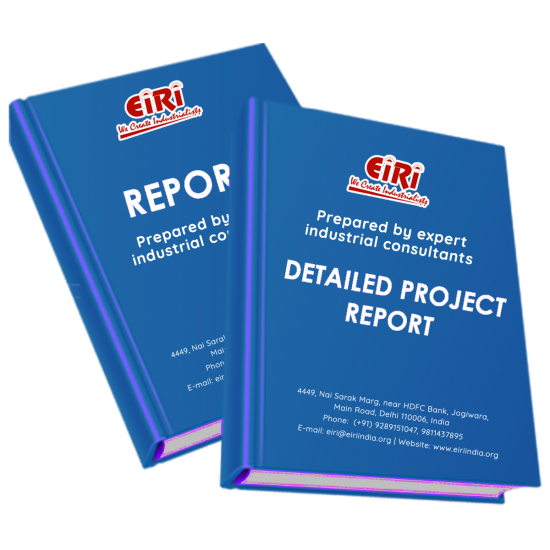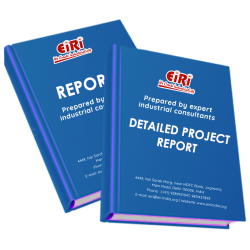Detailed Project Report on Latex Foam Rubber (Spong Rubber)

- More than 40 years of experience
- Managed by expert industrial consultants
- ISO 9001-2015 Certified
- Registered under MSME, UAM No: DL01E0012000
- 24/5 Research Support
Get your quesries resolved from an industry expert. Ask your queries before report or book purchase. - Custom Research Service
Speak to the our consultant to design an exclusive study to serve your research needs. - Quality Assurance
All reports are prepared by highly qualified consultants & verified by a panel of experts. - Information Security
Your personal & confidential information is safe & secure.
LATEX FOAM RUBBER (SPONG RUBBER)
[EIRI/EDPR/1079] J.C.: 9723
INTRODUCTION
What is Latex Foam Rubber?
Latex is NOT flexible polyurethane foam. In its natural form, latex is a milky white liquid tapped from the trunks of rubber trees (hevea brasiliensis) and then combined with water to create a thick suspension. In manufacturing natural latex foam rubber, the latex suspension is whipped to a froth and poured into carousel molds, onto a conveyor, or into sheets (for sponge rubber carpet cushion), sometimes additionally frothed using CO2 gas, chilled to below freezing, and then heated to the point of vulcanization (about 240°F). During vulcanization, molecular crosslinks are formed giving the resulting foam rubber the ability to recover its shape after compression. Traditionally, vulcanization is effected by heating the frothed latex suspension while exposing it to elemental sulfur, one or more organic accelerators, a metal oxide (ZnO) and an organic acid (stearic acid). There are many different processing formulations to accommodate different rubber and synthetic rubber blends and there are two different mechanical processing technologies used today. The Dunlop method and the Talalay mechanical process account for all latex foam rubber used in home furnishings products.
What is Synthetic Latex Foam Rubber?
Synthetic latex foam rubber is NOT flexible polyurethane foam. To use the terms “foam rubber” and “polyurethane foam” interchangeably is an injustice to both cushioning products. Synthetic latex foam rubber represents a group of materials manufactured using methods similar to natural latex foam rubber on the same processing equipment. Synthetic latex foam rubber can be the product of natural rubber suspension and rubber substitute blends, or it can be produced using a totally synthetic process such as used to produce styrene-butadiene rubber (SBR) and polymerized chloroprene, known as neoprene, introduced by DuPont in 1932. There is no polyurethane content in natural or synthetic foam rubber and, conversely, no natural or synthetic rubber content in FPF. Today’s synthetic foam rubber can provide many of the physical performance characteristics of natural foam rubber, with more attractive economics. Certain performance attributes can result from the chemical properties of synthetic rubber products. In the case of neoprene, the resulting cushioning product is known for its high degree of fire retardancy. Just as with FPF, latex foam rubber (natural or synthetic) combustion performance can be effected by fire retardant (FR) additives. With FR additives, latex foam rubber cushioning has the ability to meet existing FR requirements for residential, commercial and high risk occupancy applications.
The Economics of Rubber
Rubber production is big business. Dozens of industries worldwide, producing hundreds of different consumer and industrial products, drive the demand for rubber. And natural rubber is an expensive commodity compared to rubber substitutes. The efficiency of the vulcanization process also provides an opportunity to improve production economics. Unfilled vulcanized rubber has superb tear and elongation strength characteristics. In some cases inorganic fillers may be added. In applications, such as for sponge rubber carpet cushion, filler concentration may approach 75% of the final weight of the product. But, just as in FPF, less filler generally results in better performing products.
How Well Does Latex Foam Rubber Cushioning Perform?
Using ASTM testing standards, a number of performance evaluations have been made to compare commercial samples of unfilled latex foam rubber to various grades of FPF. It is not surprising that in most cases latex foam rubber surpassed the physical capabilities of FPF samples. After all, quality latex foam rubber is considered by many experts to be the ultimate high performance cushioning material. Of course, density plays an important role in rubber’s physical performance capabilities. Latex density typically runs 4 pounds per cubic foot and higher. And while premium performance can be achieved with latex, it is accomplished at a premium price.
Latex Foam Rubber and the Environment
Although no unusual environmental issues are associated with the manufacture of all types of latex foam rubber, like most industrial processes, care must be taken with disposal of waste water accumulated from the washing of molded latex foam parts. Latex parts may contain soaps and trace amounts of zinc from the vulcanization process that are released through multiple washings and must be monitored and controlled.
Latex Foam Rubber Recycling
Like FPF, latex foam rubber recovered as manufacturing scrap or recovered from post consumer use can be chopped and utilized when mixed with polyurethane scrap, as bonded carpet cushion. Latex foam rubber generally has a relatively high density and is soft, thus latex foam rubber can only be used in limited amounts in the production of bonded carpet cushion.
COST ESTIMATION
Plant Capacity 1 MT/Day
Land & Building (5000 sq.mt.) Rs. 4.28 Cr
Plant & Machinery Rs. 63.50 Lac
Working Capital for 2 Months Rs. 1.15 Cr
Total Capital Investment Rs. 6.29 Cr
Rate of Return 22%
Break Even Point 54%
CONTENTS
INTRODUCTION
WHAT IS LATEX FOAM RUBBER?
WHAT IS SYNTHETIC LATEX FOAM RUBBER?
THE ECONOMICS OF RUBBER
HOW WELL DOES LATEX FOAM RUBBER CUSHIONING PERFORM?
LATEX FOAM RUBBER AND THE ENVIRONMENT
ABOUT LATEX ALLERGY
USES & APPLICATION
RAW MATERIAL REQUIRED
(A) LATEX
(B) CHEMICAL
VARIOUS FORMULATIONS FOR LATEX FOAM PRODUCTS
B.I.S SPECIFICATION
MARKET SURVEY
APPLICATIONS GALORE
PRODUCTION DECLINES
LOW CONSUMPTION GROWTH
GOOD QUALITY
HIGH PROCESSING COST
PRODUCTS MANUFACTURE
PROCESS OF MANUFACTURE
1) COMPOUNDING AND MATURING
2) FOAMING AND CELLING
3) VULCANISATION:-
4) WASHING AND DRYING
COMMON DEFECTS IN FOAM MAKING
OTHER METHODS OF PREPARATION
LATEX FOAM RUBBER
EXAMPLES 1-24
EXAMPLES 25-28
SYNTHETIC LATEX FOAM RUBBER
EXAMPLE 1
INGREDIENT PARTS/100 PARTS MONOMERS CHARGE FORMULA
EXAMPLE 2
EXAMPLE 3
EXAMPLE 4
EXAMPLE 5
EXAMPLE 6
PREPARATION OF LATEX FOAM RUBBERS AND FILMS
EXAMPLE 1
EXAMPLE 2
EXAMPLE 3
EXAMPLE 4
FLAME-RETARDANT LATEX FOAMS
EXAMPLE 2
PROCESS FOR PRODUCING FOAM RUBBER-BACKED TEXTILES
EXAMPLE 1
EXAMPLE 4
PROCESS AND PLANT FOR MANUFACTURE OF LATEX FOAM PRODUCTS
PROCESS FLOW DIAGRAM FOR THE MANUFACTURE OF LATEX FOAM RUBBER
SUPPLIERS OF RAW MATERIALS
SODIUM SILICO FLOURIDE:
SUPPLIERS OF RUBBER CHEMICALS
SUPPLIER OF EQUIPMENT AND MACHINERY
BOILERS
PRESSURE VESSELS
PLANT & MACHINERY SUPPLIERS FOR RUBBER INDUSTRY
RUBBER VULCANIZER
PRESENT MANUFACTURERS OF LATEX FOAM PRODUCTS
LATEX FOAM MATTRESS
APPENDIX – A:
01. PLANT ECONOMICS
02. LAND & BUILDING
03. PLANT AND MACHINERY
04. OTHER FIXED ASSESTS
05. FIXED CAPITAL
06. RAW MATERIAL
07. SALARY AND WAGES
08. UTILITIES AND OVERHEADS
09. TOTAL WORKING CAPITAL
10. TOTAL CAPITAL INVESTMENT
11. COST OF PRODUCTION
12. TURN OVER/ANNUM
13. BREAK EVEN POINT
14. RESOURCES FOR FINANCE
15. INSTALMENT PAYABLE IN 5 YEARS
16. DEPRECIATION CHART FOR 5 YEARS
17. PROFIT ANALYSIS FOR 5 YEARS
18. PROJECTED BALANCE SHEET FOR (5 YEARS)
How to Make Project Report?
Detailed Project Report (DPR) includes Present Market Position and Expected Future Demand, Technology, Manufacturing Process, Investment Opportunity, Plant Economics and Project Financials. comprehensive analysis from industry covering detailed reporting and evaluates the position of the industry by providing insights to the SWOT analysis of the industry.
Each report include Plant Capacity, requirement of Land & Building, Plant & Machinery, Flow Sheet Diagram, Raw Materials detail with suppliers list, Total Capital Investment along with detailed calculation on Rate of Return, Break-Even Analysis and Profitability Analysis. The report also provides a birds eye view of the global industry with details on projected market size and then progresses to evaluate the industry in detail.
We can prepare detailed project report on any industry as per your requirement.
We can also modify the project capacity and project cost as per your requirement. If you are planning to start a business, contact us today.
Detailed Project Report (DPR) gives you access to decisive data such as:
- Market growth drivers
- Factors limiting market growth
- Current market trends
- Market structure
- Key highlights
Overview of key market forces propelling and restraining market growth:
- Up-to-date analyses of market trends and technological improvements
- Pin-point analyses of market competition dynamics to offer you a competitive edge major competitors
- An array of graphics, BEP analysis of major industry segments
- Detailed analyses of industry trends
- A well-defined technological growth with an impact-analysis
- A clear understanding of the competitive landscape and key product segments
Need Customized Project Report?
- Ask for FREE project related details with our consultant/industry expert.
- Share your specific research requirements for customized project report.
- Request for due diligence and consumer centric studies.
- Still haven't found what you're looking for? Speak to our Custom Research Team
About Engineers India Research Institute:
Our Approach
- Our research reports comprehensively cover Indian markets (can be modified as per your country), present investigation, standpoint and gauge for a time of five years*.
- The market conjectures are produced on the premise of optional research and are cross-accepted through associations with the business players
- We use dependable wellsprings of data and databases. What's more, data from such sources is handled by us and incorporated into the report
Why buy EIRI reports?
- Our project reports include detailed analysis that help to get industry Present Market Position and Expected Future Demand.
- Offer real analysis driving variables for the business and most recent business sector patterns in the business
- This report comprehends the present status of the business by clarifying a complete SWOT examination and investigation of the interest supply circumstance
- Report gives investigation and top to bottom money related correlation of real players/competitors
- The report gives gauges of key parameters which foresees the business execution





















